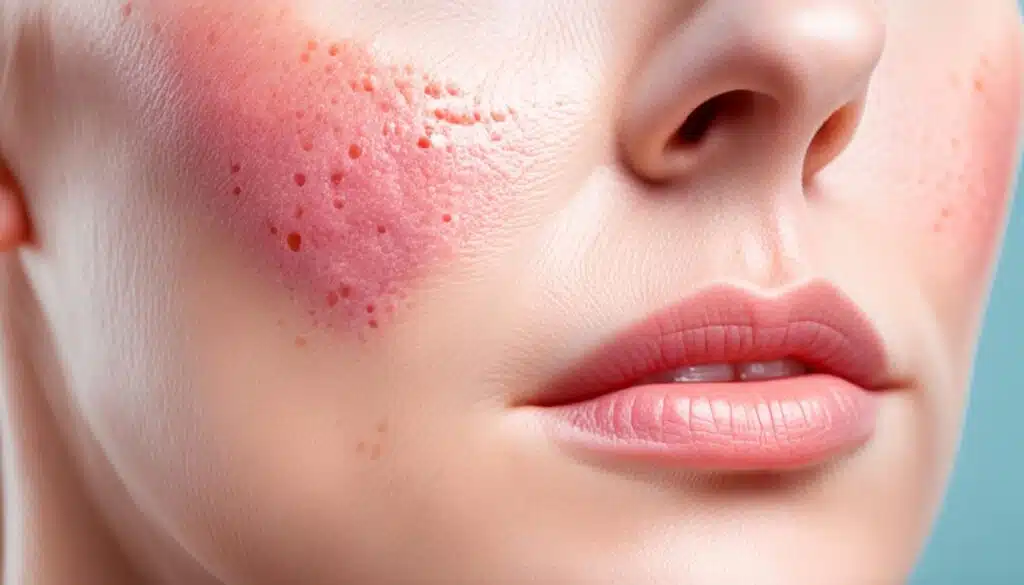Do you struggle with sensitive skin? Are you tired of dealing with redness, itching, and irritation? Understanding how to identify and manage sensitive skin care is essential in maintaining a healthy and comfortable complexion.
Sensitive skin is a skin type that is more reactive and prone to irritation. It can be triggered by various factors, including genetics, allergens, and irritants. If you frequently experience burning, stinging, or redness, you might have sensitive skin.
In this article, we will explore the causes of sensitive skin and provide expert tips on managing and caring for your skin condition. Whether you have dry, oily, combination, or blemish-prone skin, we have got you covered.
Key Takeaways:
- Sensitive skin is more reactive and prone to irritation.
- Causes of sensitive skin can vary from genetics to exposure to allergens or irritants.
- Identifying your skin type is crucial in managing sensitive skin care.
- Tailoring your skincare routine to your specific skin needs can help alleviate sensitivity.
- Consulting with a dermatologist can provide personalized advice and recommendations for managing your sensitive skin.
What Is Sensitive Skin?
The term “sensitive skin” refers to skin that is more prone to irritation and reacts more strongly to certain substances. It can be characterized by redness and sensations like burning, itching, and stinging. Sensitive skin can be caused by genetics or exposure to allergens or irritants. It is important to understand the signs of sensitive skin and how to identify if you have it.
If you have sensitive skin, you may experience frequent skin irritation and discomfort. This can be triggered by various factors, such as harsh skincare products, environmental pollutants, or even stress. Sensitive skin is not limited to a specific skin type and can affect individuals with both dry and oily skin.
Identifying sensitive skin is crucial in order to choose appropriate skincare products and establish a gentle skincare routine. The key signs of sensitive skin include:
- Redness: Sensitive skin tends to have a flushed appearance, especially in response to triggers like heat, cold, or certain ingredients in skincare products.
- Burning and stinging: Sensitive skin may feel a burning or stinging sensation when applying certain products or coming into contact with certain substances.
- Itching: Sensitive skin can be prone to itchiness, even without any visible signs of irritation.
- Dryness or flakiness: Sensitive skin may exhibit dry patches or flakiness, especially when exposed to harsh environments or irritating ingredients.
It is important to note that sensitive skin can vary from person to person. What may irritate one individual’s skin may not necessarily have the same effect on another person. Understanding your own skin’s sensitivities and triggers is essential in managing and caring for it effectively.
Common Triggers for Skin Irritation
Several factors can trigger skin irritation in individuals with sensitive skin. Some common triggers include:
- Harsh skincare products: Certain ingredients such as fragrances, sulfates, and alcohol can be harsh on sensitive skin, causing redness, dryness, and irritation.
- Environmental factors: Extreme weather conditions, like cold winds or excessive heat, can aggravate sensitive skin and lead to increased sensitivity and discomfort.
- Allergens: Exposure to allergens such as pollen, pet dander, or certain fabrics can trigger allergic reactions in individuals with sensitive skin.
- Chemicals and irritants: Contact with irritants like certain detergents, cleaning products, or even cosmetic ingredients can cause skin irritation in individuals with sensitive skin.
- Hormonal changes: Fluctuations in hormone levels, particularly during puberty, pregnancy, or menopause, can contribute to increased skin sensitivity and irritation.
By avoiding these triggers and adopting a skincare routine tailored to sensitive skin, it is possible to minimize skin irritation and maintain a healthy complexion.
Causes of Sensitive Skin
The causes of sensitive skin can vary, but it is often related to genetic factors or exposure to irritants and allergens. Some individuals may be born with naturally sensitive skin, while others may develop sensitivity due to environmental factors.
Genetic factors play a significant role in determining an individual’s skin type and sensitivity. Certain genetic variations can make the skin more susceptible to irritation and reactions. These genetic factors can affect the skin’s barrier function, making it more vulnerable to external influences.
Exposure to irritants and allergens can also trigger skin sensitivity. Common irritants include harsh soaps, fragrances, and chemical-laden skincare products. These substances can disrupt the skin’s natural balance and trigger inflammation and allergic reactions.
“Sensitive skin can react to a wide range of substances, including certain skincare ingredients, environmental pollutants, and even temperature changes.” – Dr. Sarah Walker, Dermatologist
Environmental factors can also contribute to sensitive skin. Extreme weather conditions, such as cold, dry air or excessive heat, can strip the skin of its natural moisture and disrupt the skin barrier, leading to increased sensitivity.
It is important to identify and avoid potential triggers for sensitive skin to minimize irritation and maintain skin health. Understanding the underlying causes of sensitivity can help develop a personalized skincare routine and select appropriate products for sensitive skin care.
Common causes of sensitive skin:
- Genetic factors
- Exposure to skin irritants
- Allergens in skincare products
- Extreme weather conditions
Tips for Managing Dry Sensitive Skin
Dry sensitive skin requires special care to keep it hydrated and comfortable. When dealing with dry sensitive skin, it is important to choose gentle skincare products that provide the necessary moisture without stripping the skin of its natural oils. Here are some helpful tips to manage dry sensitive skin:
- Use a pH-balanced cleanser: Look for a cleanser that is specifically formulated for sensitive skin and is pH-balanced. This helps to maintain the natural balance of the skin and prevent further dryness or irritation.
- Opt for fragrance-free products: Fragrances can be irritating to sensitive skin, so it’s best to choose skincare products that are fragrance-free. This reduces the risk of triggering any unwanted reactions.
- Moisturize regularly: Moisturizing is crucial for dry sensitive skin. Look for a moisturizer that contains barrier-restoring ingredients like ceramides and hyaluronic acid. These ingredients help to soothe and hydrate the skin, alleviating dryness and discomfort.
- Avoid harsh exfoliants: Exfoliating can be beneficial for removing dead skin cells, but harsh exfoliants can aggravate dry sensitive skin. Opt for gentle exfoliating products or consider using a soft washcloth to gently exfoliate the skin.
- Protect your skin from the sun: Even though it’s dry, sensitive skin still needs protection from the sun’s harmful rays. Choose a broad-spectrum sunscreen with a high SPF and apply it daily, even on cloudy days.
By following these tips and incorporating them into your skincare routine, you can effectively manage dry sensitive skin and promote a healthier, more comfortable complexion.
Tips for Managing Oily Sensitive Skin
Managing oily sensitive skin can be challenging, but with the right skincare routine and products, you can keep your skin balanced and healthy. Here are some tips to help you maintain your skin’s natural beauty:
1. Choose Non-Comedogenic Moisturizers
When selecting moisturizers for oily sensitive skin, look for products that are specifically labeled as non-comedogenic. These moisturizers are formulated to be lightweight and won’t clog your pores, which is essential for preventing breakouts and irritation. Non-comedogenic moisturizers provide the necessary hydration without leaving a greasy residue on your skin.
2. Opt for Gentle Foaming Face Washes
Foaming face washes are a great choice for oily sensitive skin as they effectively remove excess oil and dirt without over-drying your skin. Look for gentle formulas that are specifically designed for sensitive skin. These face washes cleanse your skin thoroughly without stripping away its natural moisture, helping to maintain a balanced complexion.
3. Avoid Harsh Ingredients
When it comes to skincare products for oily sensitive skin, it’s best to avoid harsh ingredients that can further irritate your skin. Stay away from products that contain alcohol, fragrances, and artificial dyes as these can cause redness and sensitivity. Instead, opt for gentle and fragrance-free options that are less likely to cause irritation.
4. Incorporate Oil-Controlling Products
If you have oily sensitive skin, incorporating oil-controlling products into your skincare routine can help keep shine at bay. Look for toners or serums that contain ingredients like salicylic acid or witch hazel, which can help regulate oil production without stripping your skin. Be sure to follow up with a lightweight, non-comedogenic moisturizer to keep your skin hydrated.
With these tips in mind, you can effectively manage your oily sensitive skin and achieve a healthy, radiant complexion. Remember to be consistent with your skincare routine and listen to your skin’s needs. If you’re unsure which products to use or have persistent skin concerns, consult with a dermatologist who can provide personalized recommendations.
Tips for Managing Combination Sensitive Skin
Combination sensitive skin requires a combination of effective cleansing and hydration. Gentle cleansers that remove impurities without stripping the skin’s natural moisture are ideal. Hydrating products with essential ceramides and hyaluronic acid can help balance the skin’s moisture levels. It’s important to focus on maintaining a skincare routine that addresses both dry and oily areas of the skin.
“Finding the right balance for combination sensitive skin is crucial to maintain its health and comfort.”
Effective Cleansing
To effectively cleanse combination sensitive skin, opt for a gentle cleanser that does not disrupt the skin’s natural balance. Look for products labeled “gentle” or “for sensitive skin” as they are formulated to minimize irritation. Avoid harsh cleansers with fragrances or strong ingredients that can strip the skin’s moisture.
Hydration
Hydration plays a key role in managing combination sensitive skin. Choose moisturizers with ingredients like ceramides and hyaluronic acid to help restore and maintain the skin’s moisture barrier. These ingredients aid in balancing the skin’s hydration levels, providing moisture to dry areas while not overloading oily areas. Look for products specifically formulated for combination skin to address its unique needs.
Skincare Routine
Establishing a consistent skincare routine is essential for managing combination sensitive skin. Here are some key considerations:
- Use a gentle cleanser twice a day to remove impurities and excess oil.
- Follow with a lightweight, non-comedogenic moisturizer to provide hydration without clogging pores.
- Consider incorporating targeted treatments for specific skin concerns, such as serums or spot treatments.
- Apply sunscreen daily, even on cloudy days, to protect the skin from harmful UV rays.
“Maintaining a consistent skincare routine tailored to combination sensitive skin can help improve its overall condition and reduce sensitivity.”
| Key Tips for Managing Combination Sensitive Skin | Description |
|---|---|
| Choose gentle cleansers | Look for pH-balanced cleansers that effectively remove impurities without stripping the skin’s natural moisture. |
| Prioritize hydration | Use moisturizers with ceramides and hyaluronic acid to balance the skin’s moisture levels and prevent dryness. |
| Adopt a balanced skincare routine | Establish a consistent routine with gentle cleansers, lightweight moisturizers, targeted treatments, and sunscreen. |
Tips for Managing Sensitive Blemish-Prone Skin
Sensitive blemish-prone skin requires special care to prevent breakouts and irritation. By incorporating non-comedogenic skincare products into your routine, you can minimize the risk of clogged pores and redness. It’s essential to choose products that are specifically formulated for sensitive skin and are free from fragrances and alcohol. These gentle formulations will help maintain the delicate balance of your skin while reducing the likelihood of further irritation.
When selecting skincare products for sensitive blemish-prone skin, look for ingredients that support and strengthen the skin’s barrier. Ceramides, hyaluronic acid, and niacinamide are beneficial ingredients that help soothe inflammation and maintain a healthy skin barrier.
“Using non-comedogenic products is crucial for those with sensitive blemish-prone skin. These products are designed not to clog pores, reducing the risk of further breakouts and allowing the skin to breathe.”
Additionally, it’s important to incorporate a broad-spectrum sunscreen into your skincare routine, as certain treatments may increase sun sensitivity. Choose a sunscreen specifically formulated for sensitive skin to minimize the risk of irritation and protect your skin from harmful UV rays.
Skincare Tips for Managing Sensitive Blemish-Prone Skin
- Use gentle cleansers and avoid scrubbing or over-cleansing the skin.
- Avoid harsh exfoliants and opt for chemical exfoliants with gentle ingredients like salicylic acid.
- Choose oil-free and non-comedogenic moisturizers to hydrate the skin without contributing to breakouts.
- Avoid touching or picking at blemishes to prevent further irritation and potential scarring.
- Consult with a dermatologist for personalized advice and treatment options tailored to your specific skin concerns.
| Recommended Skincare Products for Sensitive Blemish-Prone Skin | Description |
|---|---|
| Gentle Foaming Face Wash | A mild and non-drying cleanser that effectively removes impurities without stripping the skin’s natural moisture. |
| Oil-Free Moisturizer | A lightweight and non-comedogenic moisturizer that provides hydration without clogging pores or causing breakouts. |
| Blemish Treatment Gel | A targeted treatment formulated with acne-fighting ingredients like salicylic acid to help combat breakouts without irritating sensitive skin. |
| Sunscreen with SPF 30 or higher | A broad-spectrum sunscreen that provides protection against UVA and UVB rays, minimizing sun damage and potential skin irritation. |
Best Practices for Sensitive Skin Care
To effectively manage sensitive skin, it is important to understand and avoid triggers that can cause irritation. By following these sensitive skin care tips, you can minimize potential issues and keep your skin healthy and comfortable.
Sensitive Skin Care Tips
- Identify and avoid triggers: Be attentive to the ingredients in skincare products that may cause irritation. Common irritants include fragrance, alcohol, and certain preservatives. Additionally, environmental factors such as extreme weather conditions and pollution can exacerbate sensitivity. Take note of these triggers and steer clear of them.
- Select gentle products: Opt for skincare products specifically designed for sensitive skin. Look for labels that mention “sensitive skin” or “hypoallergenic.” These products are formulated to be gentle and less likely to cause irritation.
- Maintain a minimalistic skincare routine: Keep your skincare routine simple and streamlined to reduce the risk of overwhelming your skin. Use only the necessary products and avoid layering too many different formulas, which can potentially lead to irritation.
- Be gentle when cleansing and exfoliating: Use mild cleansers and avoid harsh scrubbing motions that can damage the skin’s natural barrier. Exfoliate gently and not too frequently to avoid further sensitizing the skin.
- Protect your skin from the sun: Sun exposure can exacerbate sensitivity and trigger flare-ups. Incorporate a broad-spectrum sunscreen with at least SPF 30 into your daily routine to shield your skin from harmful UV rays.
Remember, each person’s sensitive skin is unique, so it’s important to find what works best for you. Listening to your skin’s needs and adapting your skincare routine accordingly is key to managing and maintaining its health.
By following these sensitive skin care tips and implementing a tailored skincare routine, you can keep your skin happy and reduce the risk of irritation. Consult with a dermatologist for personalized advice and recommendations tailored to your specific skin concerns.
Also Read: Exploring The Hair-Nourishing Advantages Of Fish Oil
Conclusion
In conclusion, sensitive skin requires special care and attention to keep it healthy and comfortable. Understanding the causes and triggers of sensitivity is the first step in managing and maintaining your skin’s health. By implementing a skincare routine specifically tailored to your needs, you can effectively manage sensitive skin.
Remember to consult with a dermatologist for personalized advice and recommendations. They can provide valuable insights into your skin condition and suggest suitable sensitive skin care products and practices.
With the right approach, you can navigate the challenges of sensitive skin and enjoy a radiant complexion. Take the time to identify your skin’s needs and incorporate gentle and non-irritating products into your routine. By following these tips for managing sensitive skin, you can keep your skin looking and feeling its best.
FAQs
Q: What are the signs of sensitive skin?
A: Signs of sensitive skin include redness, irritation, dryness, itchiness, and a tendency to react to certain skincare products or environmental factors.
Q: How can I identify my skin type to determine if it’s sensitive?
A: You can identify sensitive skin by observing how your skin reacts to different products or environmental factors. Signs such as redness, irritation, or itchiness may indicate sensitive skin.
Q: What are the best skincare products for sensitive skin?
A: Skincare products for sensitive skin should be gentle, fragrance-free, and formulated with soothing ingredients like aloe vera, ceramides, or antioxidants. Look for products that are specifically designed for sensitive skin types.
Q: How can I manage dry skin as part of my sensitive skincare routine?
A: To manage dry skin, use a gentle cleanser, moisturize regularly with a rich cream or lotion, and avoid harsh ingredients that can further dry out the skin. Look for products that hydrate and lock in moisture.
Q: Is it recommended to consult a dermatologist for sensitive skin concerns?
A: Yes, consulting a board-certified dermatologist can help you develop a tailored skincare routine for your sensitive skin. They can recommend specific products and treatments to manage your skin condition effectively.
Q: How can I soothe and calm irritated skin?
A: To soothe and calm irritated skin, look for skincare products that contain ingredients like aloe vera, chamomile, or oat extract. Avoid harsh ingredients or fragrances that can further irritate the skin.
Q: What are the benefits of using a serum for sensitive skin?
A: Serums for sensitive skin are lightweight, fast-absorbing, and contain high concentrations of active ingredients to target specific skin concerns. They can help hydrate, soothe, and protect sensitive skin without causing irritation.











